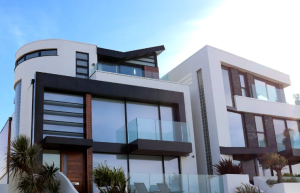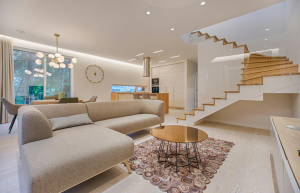Palm Jumeirah, Dubai’s luxurious man-made island, is renowned for its opulent homes and stunning vistas. However, as global awareness of environmental issues grows, residents of this prestigious locale are increasingly seeking ways to make their lavish lifestyles more sustainable. One impactful area to focus on is the bathroom, a space traditionally associated with high water and energy use. This article will delve into eco-friendly bathroom renovations, offering sustainable choices that align with the elegance and sophistication of Palm Jumeirah homes.
Why Choose Eco-Friendly Bathroom Renovations?
The bathroom is a significant contributor to a household’s environmental footprint. Traditional bathrooms consume vast amounts of water and energy and often use materials and products that are harmful to the environment. By opting for eco-friendly renovations, homeowners can significantly reduce their environmental impact while also enjoying the benefits of lower utility bills, improved health, and increased property value.
Environmental Benefits
Eco-friendly bathroom renovations can lead to substantial water and energy savings. By incorporating water-efficient fixtures and energy-saving lighting, homeowners can drastically reduce their consumption. Additionally, using sustainable materials reduces the demand for non-renewable resources and minimizes waste.
Economic Benefits
While the initial cost of sustainable upgrades can be higher, the long-term savings are considerable. Reduced water and energy bills provide ongoing financial benefits. Moreover, as the demand for eco-friendly homes rises, properties with sustainable features are likely to see an increase in market value.
Health and Well-being
Eco-friendly renovations often involve the use of non-toxic materials, which improve indoor air quality and reduce the risk of health issues. Enhanced natural lighting and better ventilation also contribute to a healthier living environment.
Key Elements of Eco-Friendly Bathroom Renovations
To achieve a sustainable bathroom renovation, focus on the following key elements: water efficiency, energy efficiency, sustainable materials, and waste management.
Water Efficiency
Water conservation is crucial in a bathroom renovation. Here are some effective strategies to reduce water usage:
Low-Flow Fixtures
Installing low-flow faucets, showerheads, and toilets is one of the simplest and most effective ways to conserve water. These fixtures are designed to use less water while maintaining strong pressure and functionality. For instance, a low-flow showerhead can reduce water usage by up to 50% without compromising on the shower experience.
Dual-Flush Toilets
Dual-flush toilets offer two flush options: a lower volume flush for liquid waste and a higher volume flush for solid waste. This feature can significantly reduce water usage, as users can choose the appropriate flush based on their needs.
Water-Saving Bathtubs
For those who enjoy soaking in a bathtub, consider a water-saving model designed to use less water while providing the same level of comfort. These bathtubs often have a more ergonomic design, allowing for a luxurious experience with less water.
Greywater Systems
Greywater systems recycle water from sinks, showers, and bathtubs for use in flushing toilets or irrigating gardens. This reduces the demand for fresh water and maximizes the efficiency of water use within the home.
Energy Efficiency
Energy-efficient features can greatly reduce the environmental impact of a bathroom. Consider the following upgrades:
LED Lighting
LED lights use up to 80% less energy than traditional incandescent bulbs and last significantly longer. They are available in various styles and colors, making it easy to find options that suit any bathroom design.
Energy-Efficient Ventilation
Proper ventilation is essential in a bathroom to prevent mold and maintain air quality. Energy-efficient exhaust fans with humidity sensors can ensure optimal performance while using less energy. These fans automatically adjust based on the moisture level in the room, providing effective ventilation only when needed.
Heated Floors
While heated floors may seem like a luxury, modern systems are highly energy-efficient. Radiant floor heating uses less energy than traditional heating methods because it distributes heat evenly and efficiently. This can be particularly beneficial in bathrooms, providing comfort while keeping energy consumption low.
Tankless Water Heaters
Tankless water heaters provide hot water on demand, eliminating the need for a storage tank and reducing energy consumption. These heaters are more efficient than traditional water heaters because they only heat water when it’s needed, avoiding the standby energy losses associated with maintaining a tank of hot water.
Sustainable Materials
Choosing sustainable materials is essential for reducing the environmental impact of a bathroom renovation. Opt for materials that are renewable, recycled, or have a low environmental footprint.
Recycled Glass Tiles
Recycled glass tiles are an eco-friendly option for bathroom surfaces. They are made from post-consumer glass and come in a wide variety of colors and styles. These tiles not only reduce the demand for new raw materials but also divert waste from landfills.
Bamboo
Bamboo is a rapidly renewable resource that is ideal for bathroom cabinetry and flooring. It is naturally resistant to moisture and pests, making it a durable and sustainable choice for humid environments like bathrooms.
Low-VOC Paints
Traditional paints can release volatile organic compounds (VOCs) that are harmful to both the environment and human health. Low-VOC paints minimize these emissions, improving indoor air quality and reducing environmental impact.
Sustainable Countertops
Countertops made from materials such as recycled glass, reclaimed wood, or eco-friendly composites are excellent choices for a sustainable bathroom. These materials often have unique aesthetics and are durable and long-lasting.
Waste Management
Proper waste management during a bathroom renovation can minimize environmental impact. Implementing strategies to reduce, reuse, and recycle materials is crucial.
Recycling Construction Waste
Many of the materials from a bathroom renovation can be recycled, including metals, glass, and certain plastics. Working with contractors who are committed to recycling can ensure that waste is properly sorted and processed.
Donating Usable Fixtures
If the existing fixtures and materials are still in good condition, consider donating them to organizations that can reuse them. This not only reduces waste but also supports community projects and helps those in need.
Composting
Organic waste, such as leftover wood or plant-based materials, can be composted. Setting up a composting system for bathroom renovation waste can turn organic materials into valuable compost for gardening.
Innovative Eco-Friendly Bathroom Features
To further enhance the sustainability of a bathroom renovation, consider incorporating innovative features that promote eco-friendliness.
Smart Showers
Smart showers allow users to control water temperature and flow rate with precision, reducing water waste. Some models also have timers and pause functions, encouraging shorter showers and further conserving water.
Greywater Recycling Showers
Advanced shower systems can filter and reuse greywater from showers for flushing toilets or irrigating gardens. These systems are highly efficient and can significantly reduce water consumption.
Composting Toilets
Composting toilets are an excellent option for reducing water usage. These toilets use natural processes to break down waste, producing compost that can be safely used in gardens. They are particularly useful in areas where water conservation is a priority.
Solar Water Heaters
Solar water heaters use the sun’s energy to heat water, reducing the need for gas or electric heating. These systems are highly efficient and can provide hot water throughout the year, even in regions with less sunlight.
Green Walls
Green walls, or vertical gardens, can be incorporated into bathroom design to improve air quality and add a natural element to the space. These walls are planted with moisture-loving plants that thrive in humid environments, creating a beautiful and sustainable feature.
Case Study: Eco-Friendly Bathroom Renovation in Palm Jumeirah
To illustrate the potential of eco-friendly bathroom renovations, let’s examine a case study of a sustainable makeover in a Palm Jumeirah home.
Initial Assessment
The bathroom in question was part of a luxurious villa but featured outdated fixtures and materials that were not environmentally friendly. The homeowners sought to reduce their environmental impact while maintaining the elegance and comfort of their bathroom.
Renovation Plan
The renovation plan focused on the following key areas:
- Water Efficiency: Installation of low-flow fixtures, dual-flush toilets, and a greywater recycling system.
- Energy Efficiency: Replacement of lighting with LED bulbs, installation of an energy-efficient exhaust fan, and addition of a tankless water heater.
- Sustainable Materials: Use of recycled glass tiles, bamboo cabinetry, and low-VOC paints.
- Innovative Features: Integration of a smart shower system and a solar water heater.
Results
The renovated bathroom achieved a 40% reduction in water usage and a 30% decrease in energy consumption. The use of sustainable materials improved indoor air quality and added unique aesthetic elements to the space. The homeowners were delighted with the results, enjoying both the environmental benefits and the enhanced luxury of their eco-friendly bathroom.
Conclusion
Eco-friendly bathroom renovations offer a compelling opportunity to combine luxury and sustainability in Palm Jumeirah homes. By focusing on water and energy efficiency, choosing sustainable materials, and implementing innovative features, homeowners can create beautiful, functional, and environmentally responsible spaces.
As global awareness of environmental issues continues to grow, the demand for sustainable living solutions is set to rise. Palm Jumeirah, with its reputation for luxury and innovation, is perfectly positioned to lead the way in eco-friendly home renovations. By embracing these sustainable choices, residents can enjoy the best of both worlds: opulence and environmental stewardship.



